#13: 1981 – Guyana
The U.S. Department of Agriculture contacted me about conducting the agricultural communications workshop in Guyana. Because I didn’t speak Spanish, I’d never worked in Central or South America, so this English-speaking country offered an intriguing opportunity. A former British colony, Guyana had a distinctively mixed population with descendants of Amerindians, British colonials, Hindu and Muslim indentured servants from the Subcontinent, as well as African slaves. [Please note: the term “Indian” in this post refers to people whose ancestors came from the Subcontinent, not “Amerindians” as they were then termed in Guyana.]
In early July, USDA sent me to Guyana to do a needs assessment, create the overall training design and obtain agreement on that design from the Ministry of Agriculture and the U.S. Agency for International Development/Guyana. I returned to Washington feeling I’d met a lot of the project stake-holders and ensured this workshop would be as on-target as possible.
The other team member was a senior professor at a respected Ag School in one of the land-grant universities. It boded well that he also had experience in developing countries. He was to cover ag extension topics, while I concentrated on communication skills training.
Reviewing my Guyana journal, I’ve rediscovered an extensive cast of characters. Using initials — as I’ve done in previous posts to protect identities — might be confusing. I’m going to keep the names of Guyanese, under the assumption that no one there will ever read this blog. But I’m changing the name of my American workshop partner to James. For other Americans in Guyana, I’ll use their job titles; e.g. AID Training Officer.
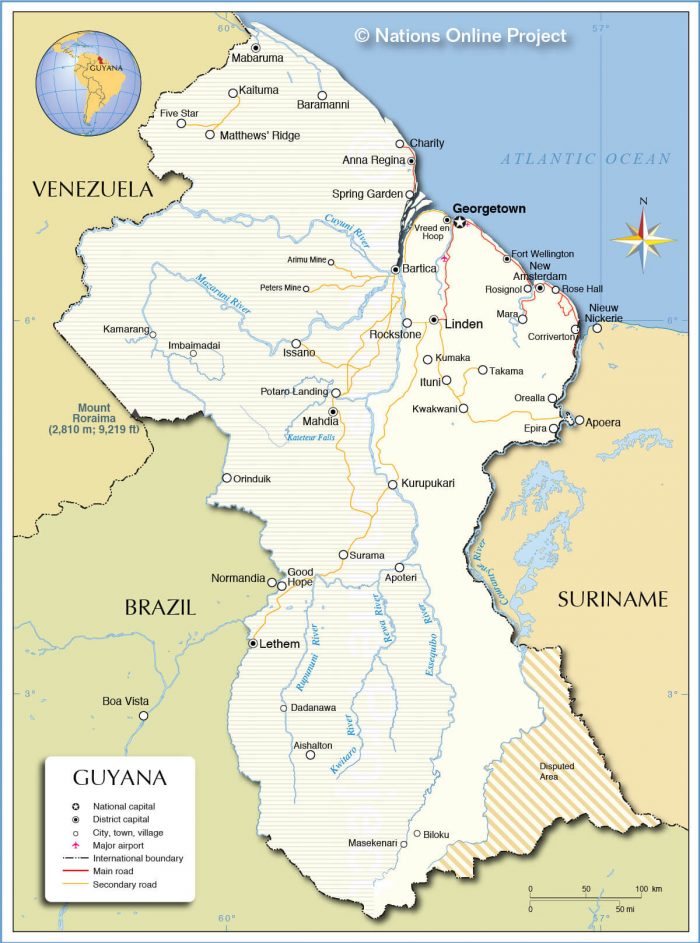
July 29
Changing planes in Miami, James throws a fit against me helping to carry our 10 boxes of course materials and 4 pieces of luggage. He’s uptight about everything: getting a sky cap, tipping the sky cap, transferring the boxes from Eastern to Guyana Air, checking in, getting duty-free stuff for Guyanese gifts, waiting for the — as usual — late plane, etc. etc.
Descending into Georgetown, the stewardess announced that most of the luggage from Miami never got on the plane, and sure enough, all 14 pieces of ours didn’t arrive. We filled out a form and were told it’ll probably come with a Saturday cargo flight.
James pushed us to the front of the Customs line since we had no luggage to be examined. The official said it was OK, but passengers complained loudly that we got special treatment. I’d been reluctant to do it, and now I’m having to consider James’s lack of sensitivity to “special treatment” issues.
A lot of treasured stuff is in my bags, and almost impossible to train sans materials, but fretting won’t fix it. The main thing is to figure out how to get undies, clothes, etc. to tide us over until Saturday (if all goes well). “Hope for the best, expect the worst…”
July 30
Georgetown hot and humid, situated below sea level, rarely blessed with cooling breezes.
I reminded James about our DC briefing not to wear watches, etc. on the street because of robbery. He harrumphed that couldn’t be the problem during the day. When we got to AID, he said to the Training Officer, “I can wear my watch during the day, can’t I?” “No,” she replied, “and don’t carry your briefcase either.”
Training Officer very helpful, calling a local expediter to get priority status for our lost luggage, loaning us 100 Guyanese shillings [c. $40] to buy what we need for now, arranging an advance on our per diem.
James and I went to Guyana Stores, where I had a super time buying panties (hated to pass up the chartreuse drawers with red lace for 3 cotton bikinis from Taiwan), deodorant and two blouses. People very helpful and sympathetic to this ignorant foreigner who didn’t know how to function in their version of a dept. store.
August 1
Guyanese expediter took us to airport. Easily found our luggage and training materials. No hassling, just a lot of red tape, much of it duplicated while the watchdogs watched the watchdogs. Only my smaller bag with shoes, vitamins and toiletries is missing. It’ll turn up eventually.
We met with Walter, head of the Guyanese Extension Service and his assistant, Ram. Arranged for secretarial help, xerox, transport and changed James’s session on method-and-result-demonstrations to include a real demonstration in the field, if possible. Also finalized logistics for our pre-course trip to Santa Mission for insight into rural life.
August 3
Up at 6:30 and off with Walter and family to Santa Mission. Near Timehri, W parked by the side of the road in a small settlement, and we walked along planks past houses on stilts to the riverbank. Climbed the stairs to meet the cousins of Walter’s wife — lots of them, all giggly, except for the new 10 day-old baby and the 80 year-old granny speechless with a stroke.
We visited for a while, and the teenagers ran off to find me some flipflops, since I only had the good shoes I flew down in (rest in lost suitcase). Because today is Freedom Day, celebrating the 1830s emancipation of slaves, most shops were closed, so no flipflops. Walter, his two daughters, their cousin and I went down the road 1/2 mile to find one open.
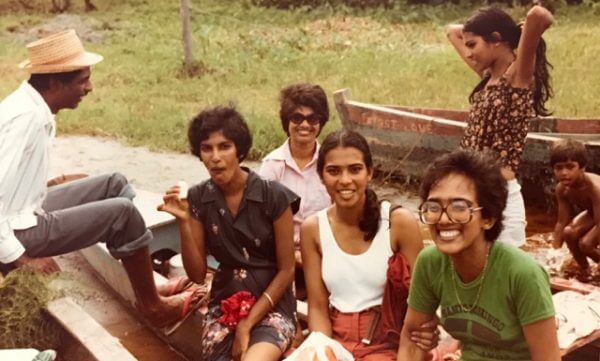
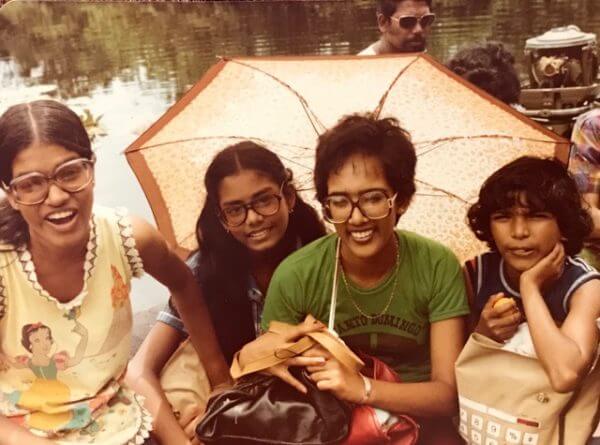
Walter and some of the cousins
Back to the house, where we loaded an old, wooden, open boat with 20 people, food hampers, boxes and bags. Engine dead. They finally got it fixed, and we left at 11:00, three hours after departing the hotel. James clearly perturbed by all the waiting and nervous about the boat. I figured this family makes its living on the river, knows what it’s doing and isn’t about to drown 18 cousins and 2 guests. We headed up the Demerara, quite wide here (couple of football fields?) and swift.
Short haul, then into a “creek” as wide as many West Virginia rivers. Dark with tannin, lined with dense jungle, 3-story stands of bamboo and royal palms, smelling of green. Slow going because traveling against the tide (which affects the Demerara 60 miles inland and can be detected 120 miles in). Floating leaves kept clogging our propeller, stalling the engine. We had to grab hanging vines/branches to keep from being swept into the bank and risk damaging the propeller before it could be cleared.
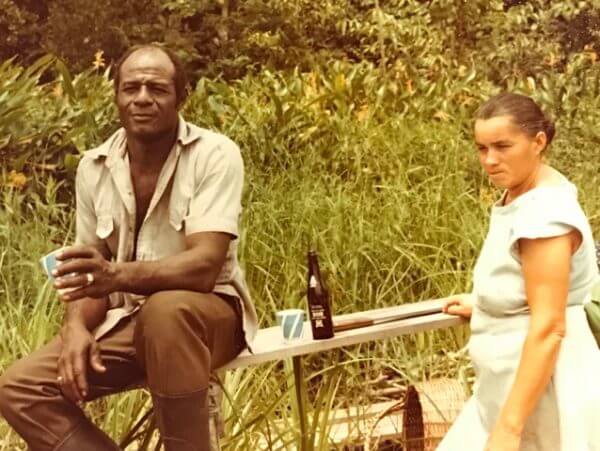 After a while, we pulled into a landing, walking a path of boats and boards across the swamp to high ground and an enormous Black man named Tyson. (“Is this Tyson’s Corner?…ha-ha-ha,” says James.) Mr. Tyson cut his farm out of the jungle 8 years ago, after working as a diamond dredger. More than any person I’ve met, he radiated waves of both toughness and warmth. Spent an hour touring his farm (avocados bigger than my hand) and meeting his family. Mrs. Tyson is as reserved as he is gregarious, but it’s clear half the success of that homestead is hers.
After a while, we pulled into a landing, walking a path of boats and boards across the swamp to high ground and an enormous Black man named Tyson. (“Is this Tyson’s Corner?…ha-ha-ha,” says James.) Mr. Tyson cut his farm out of the jungle 8 years ago, after working as a diamond dredger. More than any person I’ve met, he radiated waves of both toughness and warmth. Spent an hour touring his farm (avocados bigger than my hand) and meeting his family. Mrs. Tyson is as reserved as he is gregarious, but it’s clear half the success of that homestead is hers.
Mr. Tyson gave us avocados and a fruit I don’t know which tastes like peanut butter (honest!) — green exterior and orange flesh around a hard nut. We carried everything to the boat and gave the kids Pepsis, Mrs. T a beer and Tyson rum and Pepsi. Sat a long time and enjoyed everybody’s company while James visibly fumed, and Walter said, “This is true peacefulness here — you don’t get it often.”
We continued up the creek, literally running into the Princess Caroline (nicknamed “the African Queen” by the Americans, so now you know how it looks), an overloaded launch also heading to Santa Mission. Luckily, both boats were going slow, so no harm done.
The jungle thinned, and we rode through swampy savanna for another 15 minutes to Santa Mission, arriving around 2 pm. First a lunch of roti (chapattis made with lentils and peppers), fried chicken, beer and sodas. Followed by watching the cricket match, attending the fair, meeting Philip Duncan (former Minister of Amerindian Affairs, himself an Arawak).
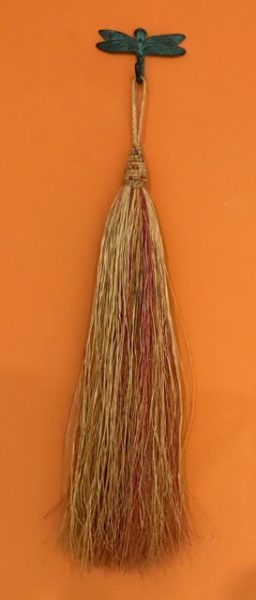 The Mission is built on a white sand hill with all houses on stilts and air conditioned by large cracks between the horizontal boards of the walls. We walked to a lady’s house, where she showed us her handicrafts, and I bought an insect whisk of dyed and natural grasses.
The Mission is built on a white sand hill with all houses on stilts and air conditioned by large cracks between the horizontal boards of the walls. We walked to a lady’s house, where she showed us her handicrafts, and I bought an insect whisk of dyed and natural grasses.
Somewhere around 2:30, James started asking when we were going home, saying he was “wilted.” I hope he’s not getting sick. Some days ago, he had the AID nurse check an inflamed bug bite. It’s now developed into a boil which will probably have to be lanced.
We left around 4:30. Return trip much faster, traveling with a strong tide.
Dined on nuts and figs, painted my toenails, washed hair, and surveyed the red welts on my bottom from panty elastic between me and a board seat for 4.5 hours. Having a good time, seeing a unique part of the world and meeting neat people.
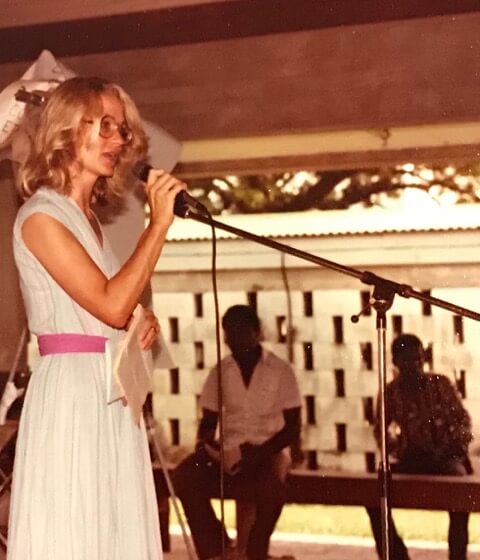 August 4
August 4
First day of course, in St. Stanislaus school auditorium, open-walled, ground floor of main building. Inauguration ceremony with many speeches, refreshments in the morning. Usual start-up exercises with participants (expectations, needs, etc.) in the afternoon with good results.
While participants worked in small groups, I opened much-delayed boxes to find USDA sent the wrong nonformal adult ed. books. Wanted to give Ps a reading assignment over the weekend. Later learned it’s logistically possible to get books here by Saturday if USDA can act on time.
Dinner with James and Jorge (Chilean extension specialist whom I’d met on previous trip), discussing how Jorge might contribute to course and which sessions he might want to observe.
August 5
AID/Guyana working with USDA/Washington to get the missing books here ASAP. Walter conducted the morning session on reorganization of MOA [Ministry of Agriculture] and the new regional extension system. A very good job. I learned a lot, and the participants got most of their concerns discussed. Rearranged schedule so Ps could catch ferry on time.
Got a call from Third Secretary at British High Commission, inviting me to a party on Friday, including a film and light supper. James not invited — can I arrange something else for him?
August 6
A third of Ps missing at 8:30 start of course. Some trickled in later, some never showed. Was it today’s topic? Today’s instructor? The course in general? Got started at 9:15, James reading from a prepared statement on extension. He was clearly nervous. I feared disaster, but once he got his statement over and started drawing a conceptual model of extension, he got lots better. He’s very top-down in his approach, but he does it pretty well.
James went back to hotel for lunch. Ram and I had spicy hamburgers at Demico House snack bar near St. Stanislaus. Afternoon devoted to posters, and Ps did a really fine job on their first effort. I was very impressed.
Dr. H, newly arrived to teach a soils course, introduced himself to us after dinner. He’s the same age as James, so I’m hoping they can be companionable.
August 7
Morning session went well altho I got tired at the end despite midmorning snack of nice finger food prepared by local woman. James went back to nurse at noon. After another Demico House lunch, I got a note that she’d lanced his boil, and he wouldn’t return today.
By the end of the day, I was really wiped out but glad to see that our first week’s evaluation was quite positive. Many of the Ps responded to James’s presentation better than I did, reinforcing that different people have different learning styles, and it’s important to set up an environment that encompasses everyone’s capabilities.
Dinner and film at British High Council Secretary’s house. A very mixed, interesting group. Diverse races, cultures, nationalities. Nice to be in a crowd that wasn’t homogeneous anything.
August 9
Sunday, but work to do. James and I went to AID and found the Xerox machine badly in need of service. While I battled it, James watched, saying he didn’t know anything about photocopiers because he’d always had someone help him. I got it going, if temperamentally, and taught James how to use it in case I’m not always around.
James wants to go on a tourist trip next weekend. One of the Ps invited us to his district and an Indian wedding. James says it’s “too tiring” to go on these trips with Guyanese, citing the strain of our Santa Mission visit. Dr. H may have a plane trip into the interior but if not, he’d like to go with us. He said he’d enjoy an Indian wedding. James: “I’ve been to one.”
August 10
Special treatment issues again. Dr. H and I skipped breakfast when we discovered the dining staff weren’t yet ready. James later bragged, “I made them serve me. You’re too soft on these people.”
Got air-frighted books from USDA/Washington and took them to course site. James went to see nurse and came later. My morning session on non-formal adult ed felt like my best of far, and Ps seemed to respond very positively.
Joined Dr. H for dinner. James came along later. He’d clearly been drinking and went into a diatribe against USAID, then one on how poorly old people are treated in the US, followed by how young people today know nothing and have no responsibility (meanwhile defending his decision to give his 10 year-old stepdaughter no chores), then a number of disparaging remarks about Mormonism when we learned Dr. H is a Mormon bishop. James ended with one against my presentation today. No matter what H & I did to change the topic, James kept his feet firmly on his own road until he was ready to change direction. I like H and hope to be able to get to know him . . . perhaps without James around? Today was H’s first teaching day, and we hardly got to talk about it.
August 11
My morning session on “Gathering Information to Plan Programs” went well. An observer from the Communications Dept. of NYC’s Hunter College came up later and invited me to visit their dept., talking with their chairman and students.
Ram said he and Walter are arranging a trip for us on Sunday along the coast toward Surinam [current spelling, “Suriname”]. I enthusiastically accepted, James acquiesced.
During lunch, I went to Houseproud to look at T-shirts with Guyanese proverbs. Chose “Never cuss alligator ’til you cross bridge.”
August 12
AID driver took me to the airport ramp, where I found my missing bag with vitamins, toiletries and shoes. All welcome, but shoes especially: feet swollen every night.
On to St. Stanislaus. James reviewing the previous 3 days instead of teaching the practical aspects of program-planning. Three participants were openly reading books during his lecture when I came in.
During the break, Ram asked if we could give the group some practical experience about program-planning. James indicated he had another 1.5 hours of lecture planned, despite having been briefed that the course should have minimal lectures — specifically aimed at the Guyanese situation — with exercises putting guidelines into practice.
James and the participants went back to his lecture, and Ram, Jorge (who was there as an observer) and I met downstairs to figure out how we might give the Ps some experience in program-planning. We decided to scrap the Wed. and Fri. afternoon sessions on exhibits and develop a worksheet which the Ps could use in groups to develop programs based on the problem-definition and data-gathering exercises of the previous days.
Jorge and I rushed off to AID to reproduce the worksheets while Ram stayed to explain to James that we’d developed this learning aid based on his lecture points. After lunch, I told the Ps we’d sensed a need for an exercise to put James’s presentation into practice and how would they feel about substituting a program-planning exercise for the exhibits workshop. They responded favorably, so we got them organized into groups and started the exercise.
James came back late from lunch plus nurse-visit and immediately left the classroom. He went out to the porch, paced up and down, refusing to return even when I came to say we needed his input. He later told Ram he didn’t like the form we’d made (so why hadn’t he made one during all the prep time he’d had, both Stateside and in-country?). We’re going to have to discuss this, but it makes sense to let it lie for a few days.
Dr. H and I went to dinner, James declining to join. We had a very interesting conversation about Mormonism. I learned a lot.
Let’s break here and return next month for the end of the story — a participant gets kicked out, James gets a lesson from Walter, and all’s well that ends well.

COMING NEXT MONTH
Guyana, Part 2: Life Lessons for One and All?

LET ME HEAR FROM YOU
Please take a moment to share your thoughts.
Your comments help make the blog better, and I always answer.

If you enjoyed reading this post, I hope you’ll SUBSCRIBE by clicking on the button below. Every month, when I post a new excerpt from my life overseas, you’ll get an email with a link so you can read the next installment. Subscription is free, and I won’t share your contact information with anyone else. Your subscribing lets me know you’re reading what I write, and that means a lot.
